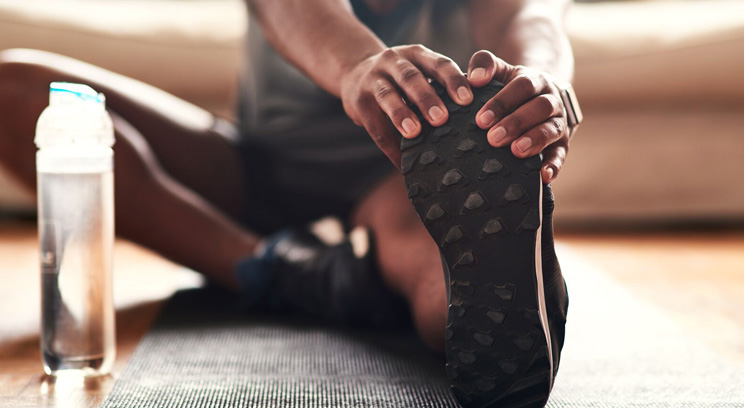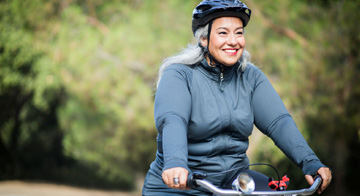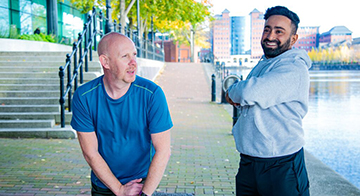There are proactive steps we can take to support our bone and joint health which can positively impact our mobility and flexibility throughout our lives.
We caught up with Will Kenton, Head of Physiotherapy at Teladoc Health, to learn more about factors that influence our bone health and to hear his top tips for looking after our bones and joints.
Why is good bone health important?
Bone health is a foundation for overall wellbeing and enables us to be physically active, while providing protection and support for the body.
Firstly, a primary function is structural support, strong bones provide the foundation allowing us to stand, move, maintain posture and balance, and challenge our bodies with our day-to-day tasks. Without strong supportive bones we’d be at a greater risk of fracture and other complications that can arise from poor bone health.
Good bone health also plays a protective function. The skull protecting the brain for example, the ribcage protecting the heart and lungs and of course our vertebral column protecting the spinal cord. Strong bones can help provide damage to vital organs in the event or trauma or an injury.
Bones also play a key role in mineral storage, particularly calcium which is vital for various bodily functions. The body needs calcium to build and maintain bones and ensure the cells of the body work properly. Alongside side mineral storage, bones house bone marrow, which releases blood cells into the bloodstream, which carry oxygen, white blood cells to help fight infection and the platelets which we require to stop bleeding.
Strong healthy bones also help prevent issues with mobility and the prevention of diseases. Healthy bones and can prevent conditions that impair function such as osteoporosis, and the impact of bone disease can have a big impact on a person’s quality of life. Fractures owing to poor bone health can drastically impact an individual’s independence and lifespan, particularly in older populations.
Bone health is a foundation for overall wellbeing and enables us to be physically active, while providing protection and support for the body.
What can affect our bone health?
There are many factors which can affect of bone health, some of which we are able to play a significant role in determining. Controllable lifestyle factors, such as diet and exercise, can mean the difference between poor bone health and a strong skeleton.
Diet is an important first step, as many nutrients and minerals we get from our food are key to healthy bones., Calcium, Vitamin D, protein, alongside other nutrients including magnesium, phosphorus and vitamins K and C are crucial for good bone health. A balanced diet, with plenty of fresh fruit, vegetables, fibre, and protein will give you the nutrients you need to look after your bone health.
Some of us, owing to genetics, age, or sex might require supplementation – for example the menopause lowers levels of oestrogen in the body which can impact on bone health and lead to osteoporosis. For many women, hormone replacement therapy (HRT) can help prevent such side effects, and your GP will be able to discuss this with you.
Smoking and drinking can also impact on bone health. Smoking has been linked to reduced bone density and increased risk of fractures, whilst excessive alcohol consumption can interfere with calcium balance and bone formation – eventually leading to bone loss.
As we get older, it is normal for our bone density to decrease. Depending on your circumstances, your doctor may suggest supplementation with calcium and vitamin D, especially if you are high risk (for example postmenopausal women and men over the age of 70). Remember to always discuss any concerns with your doctor before taking any supplements.
Hormones play a strong role in our bone health. In men, testosterone helps maintain our bone density, and in women oestrogen plays the same role. A reduction in these hormones can lead to bone loss. Other conditions such as thyroid disease can also lead to bone loss. Medical conditions and medications can also impact our bone health, alongside our bodyweight. Being underweight can increase the risk of bone loss and fractures whilst being overweight can increase bone stress.
Exercise and activity are crucial for good bone health. Exercising regularly reduces the rate of bone loss and conserves bone tissue. Equally, staying active and strong supports our balance, which reduces the risk of falls and our overall risk of fractures.
Does bone health change as we age?
For most of us, we reach peak bone mass between 30-50 years of age. After this, we begin to gradually lose bone throughout our life. A process called ‘remodelling’, where our body replaces old bone with new bone, is most efficient up until about age 40, after which less bone is replaced with new strong bone. The average rate of decline is about 1% per year. Research has shown that exercise can help to slow bone loss, and in some studies even build bone – so the process isn’t necessarily a linear one.
During the menopause, oestrogen levels drop dramatically, and significant bone loss can occur. Talking with your doctor is the first step in understanding if you require any specific treatment.
For over 65’s, bone density or loss is more pronounced, but it is equally important to stay active and make lifestyle adjustments to support good bone health.
Does our working environment affect bone health?
Our working environment can affect our bone health. Staying active through exercise and incorporating some weight-bearing activity is key to maintaining our muscle mass and good bone health.
When load is applied through our bones regularly, the bone adapts, building more bone and becoming denser and stronger. This process can help prevent bone density changes such as osteoporosis.
If your work environment is typically inactive, it’s even more important to try factor in some exercise or activity every day.




